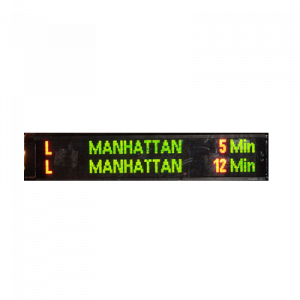As an American, Sarah Breeden had always dreamed of getting that all-American qualification: an MBA. She considered applying to several top US schools, and even had an application written (but not submitted) to the McCombs School of Business at the University of Texas at Austin.
But in the end, she chose HEC Paris in Europe, in part for its diversity — the MBA cohort is of 50 different nationalities.
“I spoke with many friends who did MBAs in the US. They said despite what admissions teams say, most of the students are actually American,” Breeden says. “There are huge benefits to learning about different cultures and traditions, which will set me up for an international job.”
Breeden’s choice highlights a big dilemma for US business schools: how to counter the falling number of international students applying to MBA courses in the country.
Data from the Graduate Management Admission Council, which runs the GMAT business school entrance exam, show a 10.5 percent fall in foreign students wanting to study in the US versus last year. Overall in America, applications fell by 6.6 percent in 2018 — the fourth straight year of declines.
Previously, the very best business schools seemed to weather the storm, as they could rely on their established brands to draw in candidates from across the world.
Yet even oldest and best-known US institutions, such as Harvard Business School and NYU Stern School of Business, have reported falling MBA applications this year, with the drop largely attributed to international candidates.
The troubles of US business schools are in stark contrast to those in the rest of the world. While GMAC reported that global demand for MBAs has fallen for the first time, in some regions the business education market is booming.
In Asia-Pacific, for example, applications to master’s degrees in business surged by 8.8 percent this year.
In Canada and Europe applications rose by 7.7 percent and 3.2 percent, respectively, with the regions boosted by growing interest from international students who want globally mobile careers, and to study in diverse cohorts.
International applicants concerned about the US political climate, visa issues
Experts blame the woes of US business schools on a range of factors. One is the increasingly unstable political environment and concerns among international students about access to visas.
Most US business schools are worried about the fall in demand from international applicants. At UC Berkeley’s Haas School of Business, applications fell by 7.5 percent and the decline was almost entirely due to waning overseas demand.
“International applications to US programs in general have declined largely due to political concerns and uncertainty around immigration policies,” says Pete Johnson, assistant dean for the full-time MBA program and admissions at Haas.
He adds that the strong US economy and near-full employment are also behind the drop, as they make potential applicants more likely to seek promotions or stay in the workforce. He goes on to say that “we remain confident in the value of an MBA degree in the marketplace”.
Access to jobs in the US is a key concern among international MBA candidates, many of whom base their choice of school on where they want to work on graduation. Companies appear to be more hesitant to hire international workers because of fears that the visa regime may be tightened under the Donald Trump administration.
According to a survey commissioned by the Wall Street Journal, in the first half of the year companies posted more than 877,000 jobs requiring US citizenship or work authorization, a 19 percent increase on last year. GMAC data also show that US companies are less likely to hire international graduates of American business schools in 2018 versus 2017.
“Undoubtedly, news of fewer job opportunities at US companies discourages many of today’s international MBA applicants from pursuing US business schools,” says Alex Min, CEO of The MBA Exchange admissions firm.
“Even for those who intend to return to their home country or move somewhere other than the US after graduation, landing a paid, summer internship at a US company is more challenging in the current political and regulatory climate.”
An MBA in Canada or Europe: increasingly attractive for many international applicants
At the same time, more progressive immigration regimes in Canada and European countries such as the Netherlands are thought to be lifting demand for business education in those countries. International applications rose at 63 percent of European business schools this year, GMAC said.
The reputation of schools in Europe, Canada and Asia is also growing, notes Johnson at Haas, “although we don’t lose many admitted students to programs outside the US”.
In addition, MBA programs in continental Europe are much cheaper than those in the US, because they are typically half the length, so students forgo less in salary and pay fewer tuition fees. Even in the UK, once thought to suffer from Brexit, the fall in the value of the pound has lifted British schools’ fortunes.
At HEC Paris, MBA tuition fees for the January 2019 intake are €66,000. In comparison, Wharton School charges $78,948 for the first year of its two-year MBA, bringing the total bill for the program to more than $150,000. Breeden says: “I did look at price, but it was not a decision-making factor that influenced where I was going. This program is cheaper, but I’m going to pay money regardless.”
Elite US b-schools still hold sway
Yet the relatively high cost of top-tier US MBA programs is offset by the large salary increases achieved by their students on graduation, believes Stacy Blackman, an admissions consultant.
She says the cost of the MBA program relative to salary potential can be a concern for lower ranked MBA programs that lack a strong global brand and alumni network. “They are more vulnerable.”
According to a recent survey by Stacy Blackman Consulting, 70 percent of MBA candidates were not concerned about the disruptive US political climate.
They were far more concerned about getting into a top US MBA program (85 percent said this was a concern) — suggesting the strong brand of the elite US schools still holds away over candidates.
Despite the recent drop in applications to these schools, their cohorts remain high quality. Min notes that average GMAT scores at the most selective US schools have climbed year-on-year — a traditional barometer of class strength.
“Some applicants have come to feel it’s not worth their time and effort to prep, test and apply,” he says. “If and when average GMAT scores drop (as they have at Stanford), it will be interesting to see how quickly previously discouraged applicants get back into the game and pursue admission.”
Back at HEC Paris, Breeden says she picked the French school also for its luxury connections, being so close to the fashion capital Paris. She previously worked in the sector and hopes to continue doing so, in Europe.
“HEC is a very well-known school for luxury, retail marketing,” she says. “In Paris and France, that brand awareness [among luxury employers] is important.”










